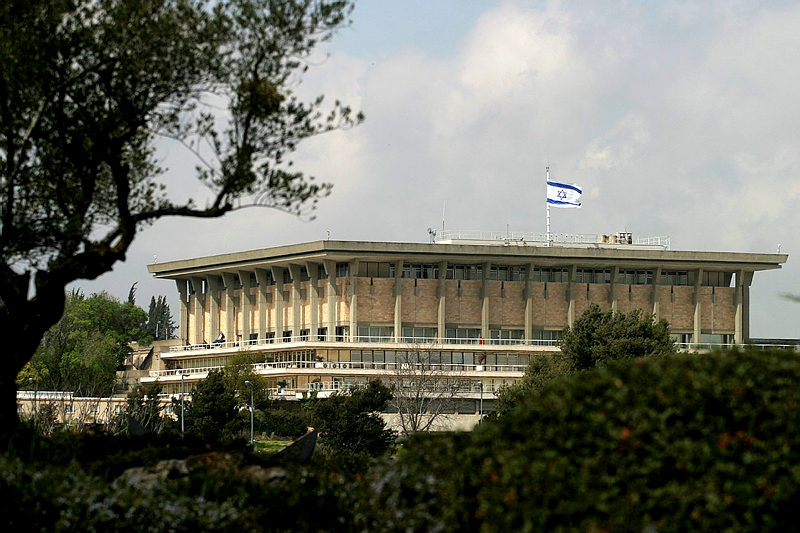Opinion: Repealing the Law to Dissolve the Knesset
An opinion submitted today (June 26th) to MKs, the Attorney General, and the Knesset Legal Advisor on behalf of the Israel Democracy Institute, opposes the proposal to repeal the law to dissolve the Knesset and seeks to take the proposal off the agenda.

Knesset | Flash 90
For the last several days the political arena has been buzzing over a proposal to repeal the law to dissolve the 21st Knesset, passed on May 30, 2019. We would like to state our vigorous opposition to this initiative and to clarify that the parties seeking to advance this proposal relate to democracy and the Basic Laws as tools to be manipulated in order to promote personal and political interests. Adopting this proposal will strike a severe blow to the public's trust and will impair the capacity of its elected officials to act with integrity.
The current proposal is just one more in a series of political maneuvers concocted in recent years, which share a common denominator: they are all motivated by narrow interests and would change the democratic rules of the game on the fly, amend Basic Laws to promote narrow interests, without allowing for sufficient public debate. Among these maneuvers are proposals to eliminate the office of President of the State, to change the electoral threshold because it is inconvenient for the current majority, to amend the Basic Law: The Government, to eliminate the President’s discretionary powers; suspend the limit on the number of ministers; the dissolution of the Knesset after an election without allowing the President to designate an alternate candidate to form a Government—and now, “undissolving” the Knesset.
Not only do these changes to the rules undermine public trust in the democratic system; they also send citizens an implicit message that political cliques and deceitful schemes serving an individual’s personal interests are now defined as normative behavior.
We are of the opinion that this proposal lacks legal feasibility.
Article 34 of the Basic Law: The Knesset empowers the Knesset to pass a law to dissolve itself. According to Article 35, this law must also stipulate the date of the elections for a new Knesset. The Knesset’s decision to dissolve itself through special legislation is a constitutional act which changes its status to that of an “outgoing Knesset” (the term employed in Article 37 of the Basic Law).
We believe that the repeal of the law to prorogue the Knesset and the cancelation of the elections for the 22nd Knesset are incompatible with the provisions of the Basic Law: The Knesset, even though that text does not explicitly rule out this possibility.
When the Knesset is dissolved it becomes an “outgoing Knesset.” It retains the authority to pass laws, but it is not empowered to reverse its decision and restore its previous constitutional status. Government branches derive their authority from explicit statutory language, and the Basic Law; the Knesset, does not include such explicit statutory language. This conclusion also derives from Article 9a, which permits postponement of Knesset elections in extraordinary circumstances, but only for the duration of those circumstances and with the support of 80 members of the Knesset. Clearly, the current proposal to call off the planned elections and “restore the status quo ante” is more dramatic, because in practice it would cancel an election that has already been set, and extend the term of a Knesset that has already prorogued itself—for a period of years, and not for the limited duration of some extraordinary circumstances. The fact that the Basic Law: The Knesset, provides a mechanism for a limited extension of the parliamentary term, with the support of 80 members of the house, corroborates the interpretation that, a fortiori, canceling the election (even early elections are elections in the full sense of the term, given that by moving up the date, the Knesset in effect determined the day when its term is over) rather than postponing is quite out of the question. Such an action would fly in the face of the Basic Law, even in the absence of an explicit statement to this effect.
Is it conceivable, for example, that 61 MKs, motivated by narrow political interests, such as surveys predicting disaster for their parties in the impending elections, could decide, a day or two before we were supposed to cast our ballot, to cancel the election? Or that the next day, after their poll numbers went up, they could again decide to dissolve the Knesset? Note that most of Israel’s elections take place early as the result of a law that dissolves the Knesset. So creating this precedent would leave the entire political system in perpetual uncertainty. The political majority—which already enjoys a great electoral advantage over the minority, including the ability to decide when elections take place—would acquire a new and not insignificant advantage if it could roll back the call for early elections when the polls predict disaster for their parties in the impending elections.
Now that the Knesset has voted to dissolve itself and called on voters to elect a new parliament, canceling the election to serve the narrow political interests of the incumbent MKs would be a breach of their obligation to be faithful servants of the public interest.
Prof. Yuval Shany
Dr. Guy Lurie
Dr. Amir Fuchs
Dr. Ofer Kenig
The Israel Democracy Institute
- Tags:
- Legislation,
- Elections 2019,
- Electoral Reform,
- Elections in Israel,
- Basic Law: The Knesset,
- Confidence in the Knesset,
- the Knesset's role,
- Democratic Values and Institutions Program,
- Political Reform Program,
- Center for Democratic Values and Institutions,
- Center for Governance and the Economy
